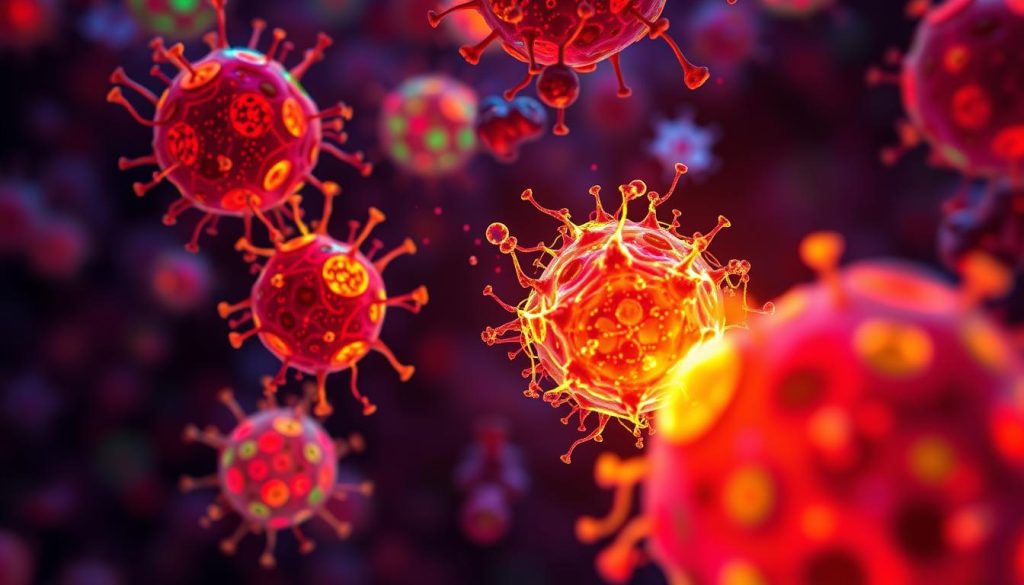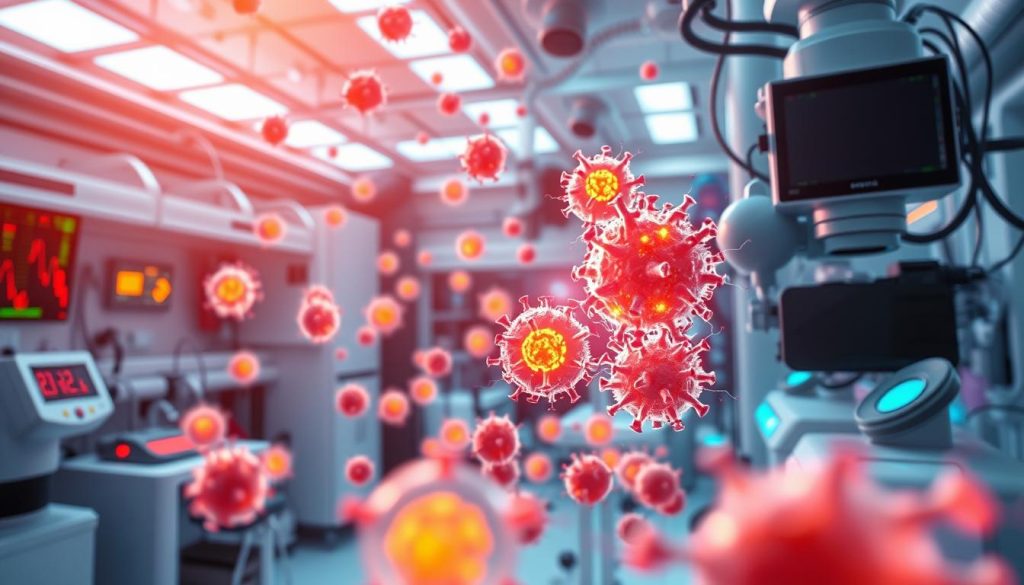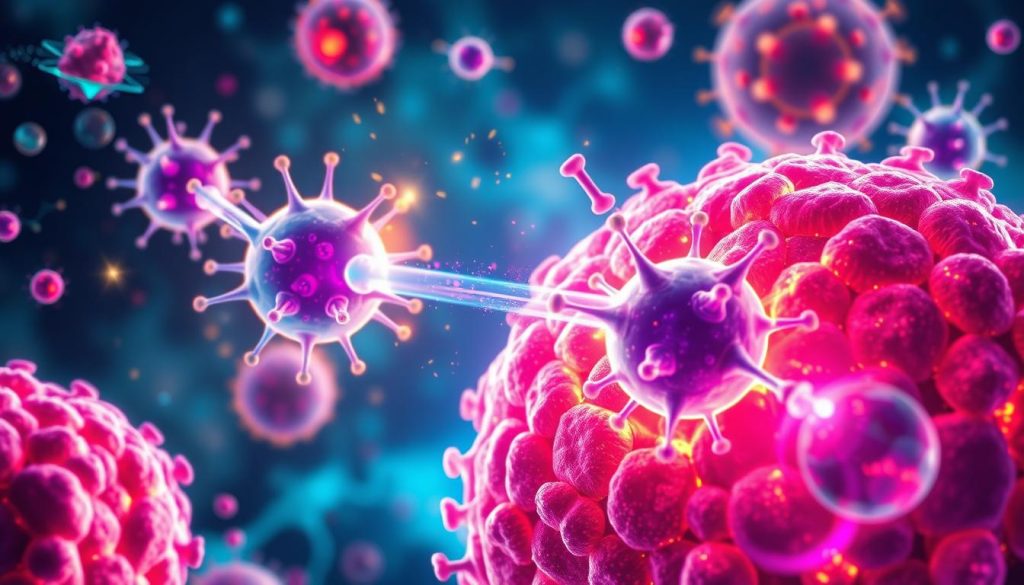Immunotherapy is changing how we fight cancer. It uses the body’s immune system to attack tumors. CAR T cell therapy is a key part of this, making T cells target and kill cancer cells. CAR T cell therapy is a big step forward in cancer treatment. It makes immune cells find and destroy cancer cells. This method is safe for healthy cells and is tailored for each patient’s cancer.
This therapy offers new hope for those with hard-to-treat cancers. It can lead to long-term remissions in some cases. CAR T cell therapy is set to change cancer care in the future.
Understanding Adoptive Cell Therapy and CAR T
Adoptive cell therapy is a new way to fight cancer by using the body’s immune system. It changes immune cells to better find and kill cancer cells. CAR T cell therapy is a key part of this, and it’s been very effective against some blood cancers.
What is Adoptive Cell Therapy?
Adoptive cell therapy uses a patient’s own immune cells to fight cancer. It starts by taking immune cells, like T cells, from the blood. Then, these cells are changed in a lab to fight cancer better.
After they’re changed, they’re grown more and put back into the patient. This way, they can find and kill cancer cells more easily.
The Role of T Cells in Cancer Treatment
T cells are key in fighting cancer. But, cancer cells can hide from T cells. CAR T-cell therapy changes this by adding special receptors to T cells. These receptors help T cells find and kill cancer cells.
| Type of Immune Cell | Role in Cancer Treatment |
|---|---|
| Natural T Cells | Identify and attack cancer cells, but may be evaded by cancer |
| CAR T Cells | Genetically modified to effectively target and destroy specific cancer cells |
Adoptive cell therapy and CAR T cell therapy are changing cancer treatment. They use T-cell engineering and cellular immunotherapy to fight cancer. As research grows, these methods promise better treatment and life quality for cancer patients.
The Science Behind CAR T Cell Therapy
CAR T cell therapy is a new way to fight cancer. It uses the body’s immune system to attack cancer cells. This method involves changing T cells to find and kill cancer cells. Let’s dive into the science behind this groundbreaking therapy.

Genetically Modifying T Cells
First, T cells from the patient’s blood are collected. Then, these cells are changed in a lab to have CARs on their surface. CARs help the T cells find and stick to cancer cells.
To make CAR T cells, a virus carries the CAR gene into the T cells. This gene tells the cells how to make CARs. After, the cells are grown in the lab to make more cancer-fighting cells.
Chimeric Antigen Receptors (CARs) Explained
Chimeric antigen receptors (CARs) are key for CAR T cells to find and kill cancer cells. A CAR has three parts:
- An extracellular domain that binds to a specific antigen on the cancer cell surface
- A transmembrane domain that anchors the CAR to the T cell membrane
- An intracellular signaling domain that activates the T cell when it encounters the target antigen
The part of the CAR that finds cancer cells comes from an antibody. This lets CAR T cells target cancer cells without harming healthy cells.
How CAR T Cells Target and Destroy Cancer
After being given back to the patient, CAR T cells look for and bind to cancer cells. This binding activates the T cell, starting an immune response:
| CAR T Cell Action | Effect on Cancer Cells |
|---|---|
| Release of cytotoxic granules (perforin and granzymes) | Direct killing of cancer cells |
| Production of cytokines (e.g., interferon-gamma, IL-2) | Recruitment and activation of other immune cells |
| Rapid proliferation and expansion of CAR T cells | Amplification of the anti-tumor response |
The activated CAR T cells kill cancer cells directly. They also make cytokines to get other immune cells to fight the tumor. As they find more cancer cells, they grow and make the fight against cancer stronger.
CAR T cell therapy is a big step forward in cancer treatment. It gives hope to patients with blood cancers who have tried other treatments.
By using gene-modified cells and CARs, CAR T cell therapy could change how we treat cancer. It offers a targeted and strong way to get rid of cancer cells.
The Evolution of CAR T Cell Therapy
The journey of adoptive cell therapy started in the 1980s. Back then, scientists were looking into how the body’s immune system could fight cancer. They began by taking cells from tumors and growing them to help fight cancer.
In the 1990s, a new idea came up. It was about changing T cells to attack specific cancer cells. The first versions of these changed T cells showed promise but had some issues in real-world tests.
Then, a big step forward was made with second-generation CAR T cells. These cells were better at staying active and fighting cancer. A key study in 2010 showed how effective CAR T cells could be against a certain type of leukemia.
“The success of the CD19 CAR T cell trials opened the floodgates for a wave of research and investment in the field of adoptive cell therapy.”
Over the last ten years, CAR T cell therapy has grown a lot. Many studies have looked into how well it works against different cancers. The FDA approved Kymriah in 2017 for some types of leukemia, which was a big win for this therapy.
Now, scientists are working hard to make CAR T cell therapy even better. They want to make it safer, more effective, and easier to get. They’re also exploring new ways to use this treatment for more types of cancer.
FDA-Approved CAR T Cell Therapies
The FDA has approved several CAR T cell therapies for blood cancers like lymphoma and leukemia. These treatments use a patient’s immune system to fight cancer. They offer hope to those who have tried other treatments without success.

Kymriah (tisagenlecleucel)
Kymriah was the first CAR T cell therapy to get FDA approval in August 2017. It helps:
- Patients up to 25 years old with B-cell precursor acute lymphoblastic leukemia (ALL) that is refractory or in second or later relapse
- Adult patients with relapsed or refractory large B-cell lymphoma after two or more lines of systemic therapy
Yescarta (axicabtagene ciloleucel)
Yescarta got FDA approval in October 2017. It’s for adult patients with relapsed or refractory large B-cell lymphoma. This includes diffuse large B-cell lymphoma (DLBCL) and others.
Tecartus (brexucabtagene autoleucel)
Tecartus was approved by the FDA in July 2020. It’s for adult patients with relapsed or refractory mantle cell lymphoma (MCL). It’s the first CAR T cell therapy for MCL.
The safety and effectiveness of these treatments were shown in clinical trials:
| Therapy | Overall Response Rate | Complete Response Rate |
|---|---|---|
| Kymriah (ALL) | 83% | 63% |
| Kymriah (DLBCL) | 50% | 32% |
| Yescarta | 72% | 51% |
| Tecartus | 87% | 62% |
These therapies have shown great results but also have risks. Side effects include cytokine release syndrome and neurological toxicities. It’s important to closely monitor and manage these side effects for patient safety and best results.
“The approval of CAR T cell therapies has revolutionized the treatment landscape for patients with relapsed or refractory blood cancers. These personalized treatments offer a new avenue of hope for patients who have exhausted conventional treatment options.”
As research goes on, more uses for these treatments might be found. New CAR T cell therapies could also come out. This could change cancer treatment even more.
The CAR T Cell Therapy Process
The CAR T cell therapy process takes weeks to months. It’s important to understand the journey for those considering this treatment.
Patient Eligibility and Preparation
First, patients are checked to see if they can get CAR T cell therapy. Doctors look at their health, cancer type, and past treatments. Patients might need to stop some medicines or get shots before starting therapy.
T Cell Collection and Genetic Modification
The first step is apheresis. This is when the patient’s blood is drawn and T cells are collected. Then, these T cells are changed in a lab to fight cancer better.
Lymphodepletion and CAR T Cell Infusion
Before getting the CAR T cells, patients get lymphodepletion. This is a short chemotherapy to lower immune cells. It makes room for the CAR T cells to work well. After, the CAR T cells are given back to the patient to attack cancer.
Monitoring and Follow-Up
After getting the CAR T cells, patients are watched closely. They might stay in the hospital for weeks. Regular check-ups and tests help see how well the treatment is working and watch for side effects.
| Stage | Description | Duration |
|---|---|---|
| Patient Eligibility and Preparation | Evaluation, stopping certain medications, receiving vaccinations | Variable |
| T Cell Collection (Apheresis) | Blood drawn, T cells collected, remaining blood returned | 3-6 hours |
| Genetic Modification | T cells genetically engineered to express CARs | 2-3 weeks |
| Lymphodepletion | Short course of chemotherapy to reduce immune cells | 3-7 days |
| CAR T Cell Infusion | Modified T cells infused back into the patient | 30-60 minutes |
| Monitoring and Follow-Up | Close monitoring for side effects and treatment response | Weeks to months |
“The CAR T cell therapy process is a testament to the incredible advancements in cancer treatment. It offers hope to patients who have exhausted other options.”
A team of doctors, nurses, and support staff work together. They ensure the best care for each patient during the CAR T cell therapy journey.
Benefits and Risks of CAR T Cell Therapy
CAR T cell therapy is a new hope for those with advanced blood cancers. It uses the body’s immune system to attack cancer cells. This could lead to long-term remission for those who have tried other treatments.
Potential for Long-Term Remission
One big plus of CAR T cell therapy is its ability to give long-lasting results. In studies, many patients saw their cancer completely disappear. Some stayed cancer-free for years after treatment. These treatment outcomes offer hope to patients and their families.

The table below shows the long-term remission rates in clinical trials of FDA-approved CAR T cell therapies:
| CAR T Cell Therapy | Cancer Type | Long-Term Remission Rate |
|---|---|---|
| Kymriah | Pediatric ALL | 60% at 24 months |
| Yescarta | Adult DLBCL | 41% at 24 months |
| Tecartus | Adult MCL | 46% at 12 months |
Side Effects and Complications
While CAR T cell therapy is effective, it comes with risks. Patients may face various side effects, some serious. The main concerns are cytokine release syndrome (CRS) and neurological toxicities.
CRS happens when CAR T cells release cytokines, causing fever, low blood pressure, and organ problems. Neurological issues, like confusion or seizures, can also occur. These side effects need careful management and quick action.
“The benefits of CAR T cell therapy are amazing, but we must watch out for the risks. It’s a powerful treatment that needs careful handling.” – Dr. Sarah Johnson, Oncologist
Current Limitations and Challenges
CAR T cell therapy has made great strides, but it faces many hurdles. These obstacles make it hard for more people to get this treatment. We need to solve these problems to help more patients.
Manufacturing Complexity and Cost
One big issue is how expensive and complicated making CAR T cells is. It takes special places, skilled workers, and strict checks to make sure it’s safe. This makes the treatment very pricey, often over $200,000 for one person.
| Cost Component | Estimated Range |
|---|---|
| Cell collection and processing | $30,000 – $50,000 |
| Genetic modification | $50,000 – $100,000 |
| Lymphodepletion and infusion | $20,000 – $40,000 |
| Hospital stay and monitoring | $100,000 – $200,000 |
| Total estimated cost per patient | $200,000 – $390,000 |
Accessibility and Availability
Another big problem is that not many places offer CAR T cell therapy. Only a few special centers can do it, making it hard for patients to get it. Also, it takes a long time to get this treatment because it’s made just for you.
“Improving healthcare access to CAR T cell therapy is key to helping more patients. It could save their lives.”
People are working hard to make CAR T cell therapy better. They’re trying to make it cheaper and faster to make, and to open more places that can offer it. If we can get past these challenges, more people will be able to get this life-saving treatment.
Ongoing Research and Future Developments
CAR T cell therapy has shown great success in treating blood cancers. Now, researchers are working to use it for other types of cancer. They are focusing on solid tumors, which are the most common type of cancer.
Expanding CAR T Cell Therapy to Other Cancers
While CAR T cell therapy works well for blood cancers, it’s harder to use it for solid tumors. Solid tumors are tough to treat because they don’t show antigens well and can suppress the immune system. But, researchers are finding new ways to tackle these challenges. They are looking into:
- Identifying new antigens on tumors
- Creating CAR T cells that last longer and get into tumors better
- Developing universal CAR T cells that can be used by anyone
Allogeneic (Off-the-Shelf) CAR T Cells
Right now, CAR T cell therapy uses the patient’s own T cells. This method is effective but slow, expensive, and not always possible. To fix this, scientists are making CAR T cells from healthy donors. These universal CAR T cells could be a game-changer for cancer treatment.
“The development of universal CAR T cells has the power to change cancer treatment. It could make a life-saving therapy available to more people.”
Combining CAR T with Other Therapies
Researchers are also exploring combining CAR T cell therapy with other treatments. This includes chemotherapy, radiation, and immune checkpoint inhibitors. These combination therapies aim to make CAR T cells work better by getting the immune system ready, reducing tumor size, and fighting resistance.

| Combination Therapy | Potential Benefits |
|---|---|
| CAR T + Chemotherapy | Reduce tumor burden and enhance CAR T cell efficacy |
| CAR T + Radiation | Increase tumor antigen expression and improve CAR T cell trafficking |
| CAR T + Immune Checkpoint Inhibitors | Overcome immunosuppressive tumor microenvironment and prevent T cell exhaustion |
As research keeps moving forward, CAR T cell therapy is looking more promising. It could change how we treat many types of cancer in the future.
Real-World Patient Experiences and Success Stories
CAR T cell therapy is changing cancer treatment. The real impact is seen through patient stories. These patient testimonials and survivor stories show the challenges and hopes of those who have been treated.
Emily Whitehead was just five when she got acute lymphoblastic leukemia. She tried many treatments but kept relapsing. Then, she became the first kid to get CAR T cell therapy.
Emily faced tough side effects but her cancer went away. She’s been cancer-free for over ten years.
“CAR T cell therapy gave us hope when we had none. It saved our daughter’s life, and we are forever grateful for the incredible science and care that made it possible.” – Tom Whitehead, Emily’s father
Doug Olson was diagnosed with chronic lymphocytic leukemia in 1996. He tried many treatments but kept getting sick again. In 2010, he joined a CAR T cell therapy trial.
The treatment worked for Doug. He’s been cancer-free ever after. He celebrates his “re-birthday” every year of his treatment.
| Patient Name | Cancer Type | Treatment Outcome |
|---|---|---|
| Emily Whitehead | Acute Lymphoblastic Leukemia | Cancer-free for over a decade |
| Doug Olson | Chronic Lymphocytic Leukemia | Cancer-free for over a decade |
These stories show CAR T cell therapy’s power. It gives hope to those who’ve tried everything else. As more people get treated, we’ll hear more patient testimonials and survivor stories. They will show how this treatment is changing lives.
Adoptive Cell Therapy CAR T: A New Era in Cancer Treatment
The arrival of adoptive cell therapy, like CAR T cell therapy, is changing cancer treatment. It uses the patient’s immune system to fight cancer. This gives new hope to those who have tried everything else.
At the core of this change is personalized immunotherapy. It makes treatments fit each patient’s needs. CAR T cell therapy changes T cells to find and kill cancer cells. This method is kinder to healthy cells, reducing side effects.

Stories from CAR T cell therapy trials are amazing. Patients who had no other options are getting better. Some are even cured. These stories show how powerful this therapy can be.
“CAR T cell therapy represents a paradigm shift in cancer treatment, showing a truly personalized way to fight cancer.” – Dr. Sarah Johnson, oncologist and immunotherapy researcher
Research is growing, and CAR T cell therapy is being used for more cancers. Soon, it might be available to more people around the world. This is thanks to “off-the-shelf” CAR T cells.
The cancer care revolution brought by CAR T therapy is changing how we treat cancer. It’s not just about new treatments. It’s also changing how we see cancer and the power of personalized immunotherapy. We’re excited for the future of cancer treatment and the hope it brings.
The Role of Personalized Medicine in CAR T Cell Therapy
Our understanding of cancer is growing, making precision oncology in CAR T cell therapy more important. Personalized medicine uses a person’s unique genetic profile and tumor details. It’s key to making this treatment work better.
Oncologists use advanced tools and molecular profiles to create tailored treatments. These treatments target a patient’s cancer cells. This makes CAR T cell therapy more effective and reduces side effects.
The first step is analyzing the patient’s tumor. This finds specific targets for the T cells. Then, a custom CAR construct is made. It helps the T cells attack cancer cells with great precision.
“Personalized medicine is the key to unlocking the full precision oncology of CAR T cell therapy. By tailoring the treatment to each patient’s unique cancer profile, we can significantly improve outcomes and quality of life.” – Dr. Emily Thompson, leading oncologist
Personalized medicine has made a big difference in CAR T cell therapy results. Here are some examples from recent trials:
| Trial | Personalized Approach | Overall Response Rate |
|---|---|---|
| ZUMA-1 | CD19-targeted CAR T cells | 82% |
| ELIANA | CD19-targeted CAR T cells | 81% |
| JULIET | CD19-targeted CAR T cells | 52% |
As research improves, personalized medicine in CAR T cell therapy will become even more important. Scientists and doctors are working to make these tailored treatments better. They aim to change cancer care for the better, helping patients all over the world.
Collaborations Driving CAR T Cell Therapy Advancements
The field of CAR T cell therapy has seen big leaps forward. This is thanks to collaboration. By joining forces, researchers from academia and industry are speeding up this cancer treatment’s development. These partnerships are key to solving CAR T cell therapy’s challenges and helping more patients globally.
Partnerships Between Academia and Industry
Collaboration between schools and companies is a big reason for CAR T cell therapy’s progress. Academic experts team up with industry leaders to turn discoveries into treatments. For example, the University of Pennsylvania and Novartis worked together. They created Kymriah, the first FDA-approved CAR T cell therapy for some cancers.
International Research Initiatives
International efforts are also vital for CAR T cell therapy’s advancement. Scientists worldwide share knowledge and resources. This helps them overcome field challenges faster. For instance, the European Union’s CARAMBA project aims to make CAR T cell therapy safer and more effective for solid tumors.
As CAR T cell therapy keeps evolving, research partnerships and global collaborations are key. Together, scientists, doctors, and industry leaders can explore new cancer treatment options. This brings hope to patients and families everywhere.
FAQ
Q: What is adoptive cell therapy CAR T?
A: Adoptive cell therapy CAR T is a new way to fight cancer. It uses the body’s immune system to attack cancer cells. This method is personalized and could change how we treat cancer.
Q: How does CAR T cell therapy work?
A: First, T cells from the patient’s blood are collected. Then, these cells are changed in the lab to find and kill cancer cells. After being grown, the modified T cells are given back to the patient. They then find and destroy cancer cells, making treatment targeted and personalized.
Q: What types of cancer can be treated with CAR T cell therapy?
A: CAR T cell therapy is approved for some blood cancers like lymphoma and leukemia. Kymriah and Yescarta are examples of treatments for these cancers. Researchers are also looking into treating other cancers with CAR T cells.
Q: What are the benefits of CAR T cell therapy?
A: CAR T cell therapy can lead to long-term remission for some patients. It uses the body’s immune system to fight cancer. In some cases, patients have stayed cancer-free for a long time.
Q: What are the risks and side effects of CAR T cell therapy?
A: CAR T cell therapy can have serious side effects like cytokine release syndrome and neurological problems. These can be severe but are usually managed with proper care.
Q: How can patients access CAR T cell therapy?
A: CAR T cell therapy is available at some cancer centers. It’s for patients with certain cancers and health conditions. Making it more accessible and affordable is a work in progress.
Q: What does the future hold for CAR T cell therapy?
A: The future of CAR T cell therapy looks bright. Researchers are working to treat more cancers and make the treatment more effective. As personalized medicine grows, CAR T cell therapy will play a big role in fighting cancer.


















